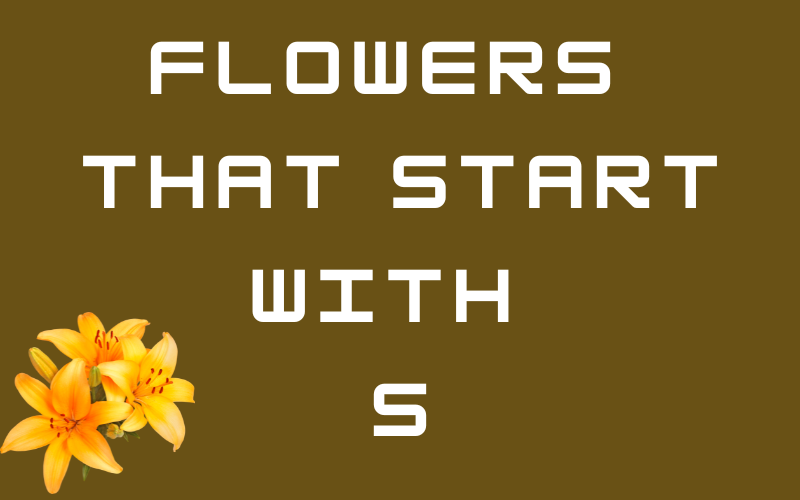There are many beautiful flowers name starting with S. Some of the most popular ones include sunflowers, snapdragons, and sweet peas. Sunflowers are known for their large, bright yellow petals that resemble the sun. These flowers are also very easy to grow and can add a cheerful touch to any garden or landscape.
Snapdragons are another favorite flower that comes in a variety of colors, including pink, purple, and white. Their unique shape means that they resemble the mouth of a dragon, hence their name. Finally, sweet peas are fragrant flowers that also come in a range of colors, and they are often used as a symbol of friendship and joy.
Other flowers that start with the letter S include snowdrops, star-of-Bethlehem, and spider lilies. Each of these flowers is unique and can bring a special touch to any garden or floral arrangement.
Flowers Name Starting with S
Scotts Clematis
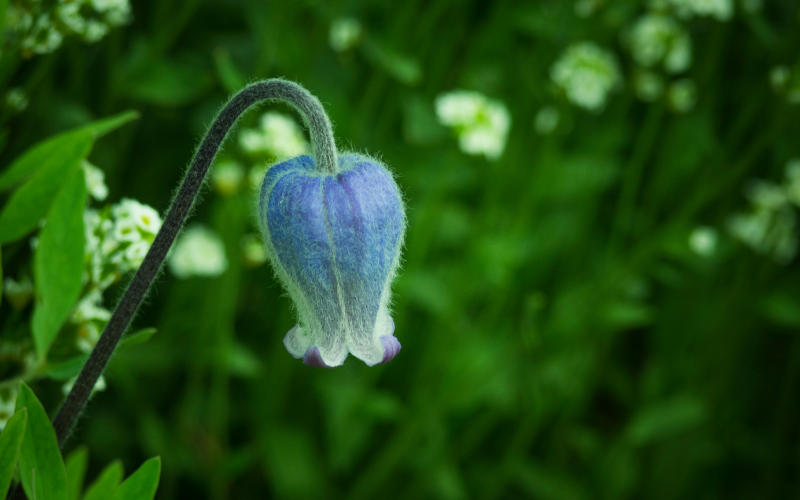
Scotts clematis flower is a beautiful flowering plant that can add a pop of color to any garden. This particular clematis is known for its large, deep blue flowers with a white center and bright yellow stamens.
It’s a vigorous climber that can reach up to 10 feet tall and can add height and interest to a fence or trellis. Scotts clematis flower is a hardy plant that can thrive in full sun or partial shade, making it a versatile addition to any garden. It’s also a low-maintenance plant that requires little pruning, making it an easy choice for those who want a beautiful garden without a lot of upkeep.
| Scientific Name | Clematis Scottii |
| Native Range | Northern New Mexico and southern Colorado |
| Flowering Season | Summer |
Sea Thrift
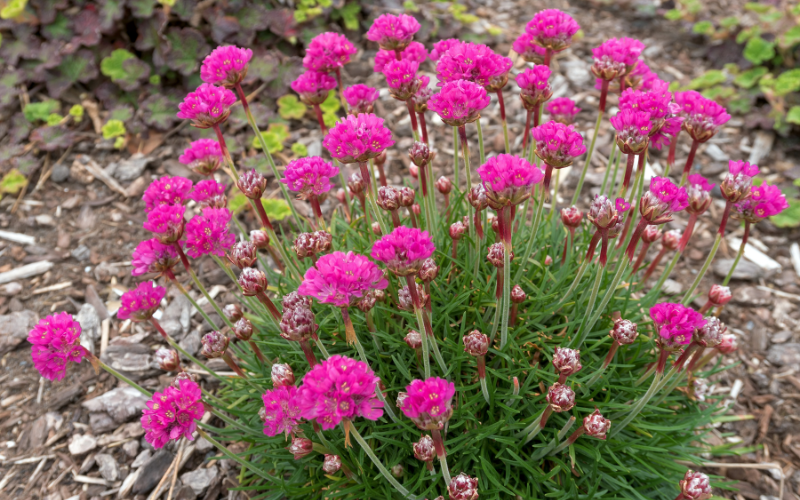
Sea thrift is a beautiful plant that grows in coastal areas all around the world. The term “thrift” comes from the Old Norse word “rift,” which means “prosperity” or “good fortune.” This flower blooms in the spring and summer and features clusters of small pink or white flowers on top of long, slender stems that resemble miniature pompoms.
It is not only beautiful, but it has a long history of medical usage in traditional folk medicine. It has been used to treat respiratory issues and digestive problems, and even as a natural remedy for headaches. Sea Thrift is a true gem of the coastal landscape and a testament to the beauty and resilience of nature.
| Scientific Name | Armeria maritima |
| Native Range | Northern Europe, from northern California to Iceland to Siberia |
| Flowering Season | Spring |
Shooting Star Flower
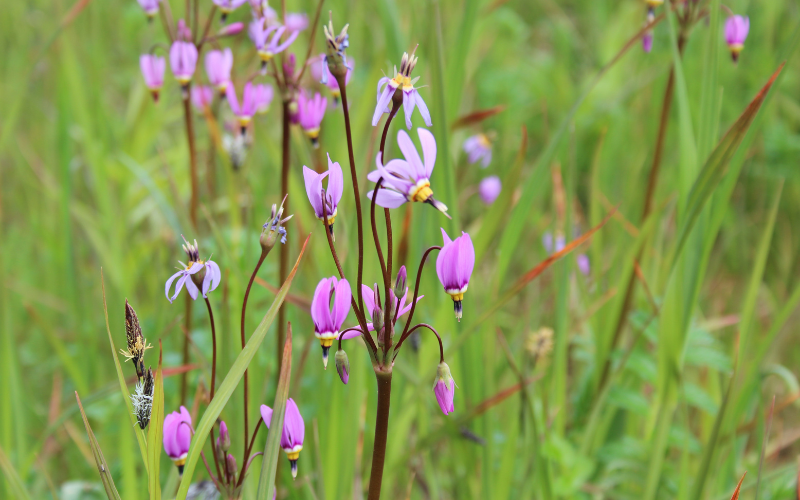
The shooting star flower is a delicate and beautiful wildflower that can be found in meadows and prairies across North America. The flower gets its name from its unique shape, with petals that curve backward like shooting stars. Its color can range from pink, purple, and magenta, to white. These flowers bloom in the spring, usually between April and June, and last for about a month.
Despite their beauty, shooting star flowers are relatively low maintenance and can thrive in a range of soil conditions. They are a true gem of the North American floral landscape, and their unique shape and vibrant colors make them a favorite for nature lovers and gardeners alike.
| Scientific Name | Primula sect. Dodecatheon |
| Native Range | Eastern and Central United States |
| Flowering Season | Mid-spring |
Showy Milkweed
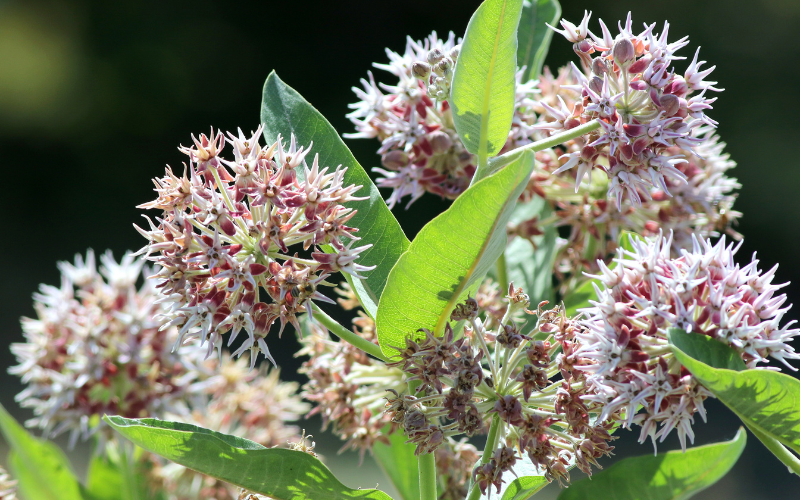
Showy milkweed is a beautiful perennial flower that typically grows in fields and meadows across North America. Its bright, deep-pink clusters of flowers are a sight to behold and attract a variety of pollinators, including butterflies and bees.
The plant’s leaves are a significant source of food for monarch butterfly caterpillars, making it an important addition to any garden or natural habitat conservation project. Showy milkweed is also a hardy plant that is easy to grow and maintain, making it an ideal choice for novice gardeners or those looking to add color and beauty to their landscape.
| Scientific Name | Asclepias speciosa |
| Native Range | United States |
| Flowering Season | Late spring to early summer |
Siberian Bugloss
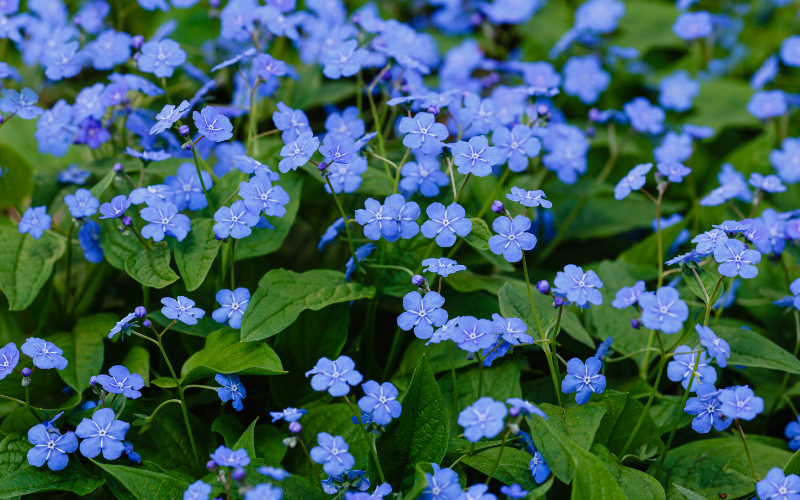
Siberian bugloss is a beautiful flowering plant that can add a touch of elegance and charm to any garden. The plant has heart-shaped leaves that are covered in silver-white spots, creating a stunning contrast against the bright blue flowers that bloom in the spring.
Siberian bugloss is a hardy plant that can survive in a variety of conditions, including partial shade and moist soil. It’s a popular choice for gardeners because of the plant’s ability to attract pollinators, such as bees and butterflies. Siberian bugloss is a versatile and beautiful plant that can bring joy to any garden.
| Scientific Name | Brunnera macrophylla |
| Native Range | Caucasus |
| Flowering Season | Spring |
Siberian larkspur
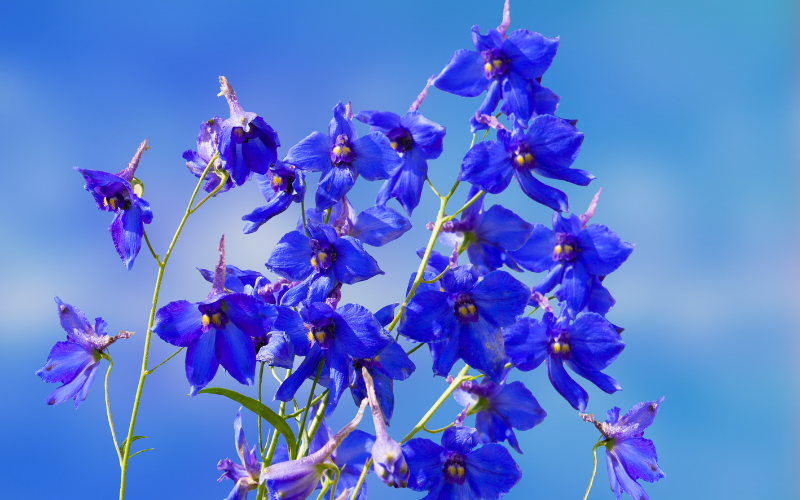
The Siberian larkspur is a beautiful and unique flower that is native to northern Asia, specifically Siberia. It is known for its tall and slender stems that can reach up to three feet in height. The flower blooms in a range of colors, from deep blue to purple, and can even have white or pink tones.
What makes this flower unique is its delicate, feathery petals that give it a soft and dreamy appearance. The Siberian larkspur is a popular choice among garden enthusiasts for its striking appearance and its ability to attract beautiful butterflies and bees to the garden.
| Scientific Name | Delphinium grandiflorum |
| Native Range | Russia and China |
| Flowering Season | Summer |
Silver Sage
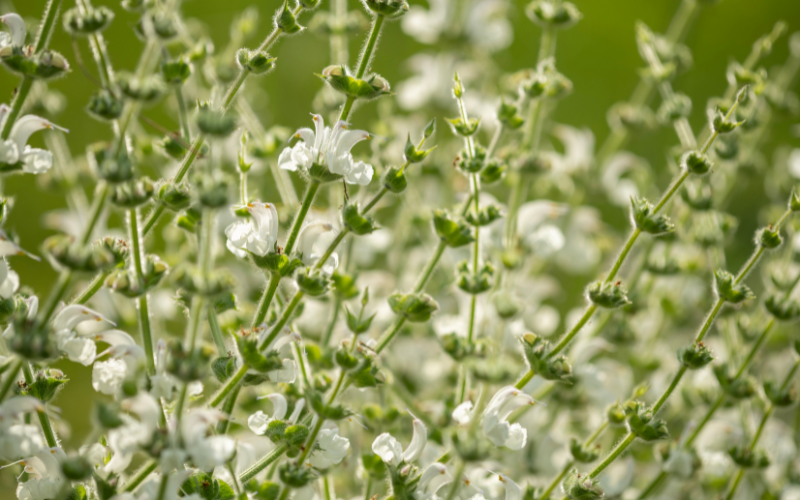
Silver Sage, also known as Artemisia ludoviciana, is a Native American plant that is valued for its ornamental foliage and medicinal properties. This plant has silver-gray leaves that are soft and fuzzy to the touch, and it produces small yellow flowers that bloom in the summer.
In Native American cultures, the plant is believed to have spiritual and healing properties, and it is used in smudging ceremonies to cleanse and purify the air. If you’re looking for a low-maintenance plant that also has interesting cultural and medicinal significance, Silver Sage might be the perfect choice for you.
| Scientific Name | Salvia argentea |
| Native Range | Southern Europe, the eastern Mediterranean, and northwest Africa |
| Flowering Season | Summer |
Silver Spurflower
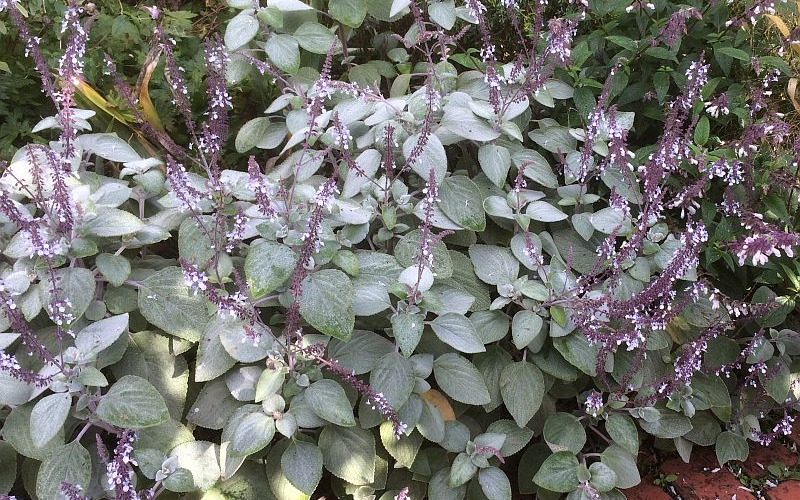
The Silver Spurflower is a stunning and unique flower that is native to South Africa. Its botanical name is Plectranthus argentatus, and it is known for its striking silver foliage, which is velvety to the touch. The plant is a member of the mint family and produces small, delicate white or lavender flowers that bloom in the late summer and early fall.
The Silver Spurflower is a popular choice for landscaping and container gardening because of its hardiness and low maintenance requirements. It prefers bright, indirect light and well-draining soil, making it an easy plant to grow indoors or outdoors. The Silver Spurflower is a beautiful and versatile plant that is sure to add a touch of elegance to any garden or home.
| Scientific Name | Plectranthus argentatus |
| Native Range | Australia |
| Flowering Season | Summer |
Snapdragon
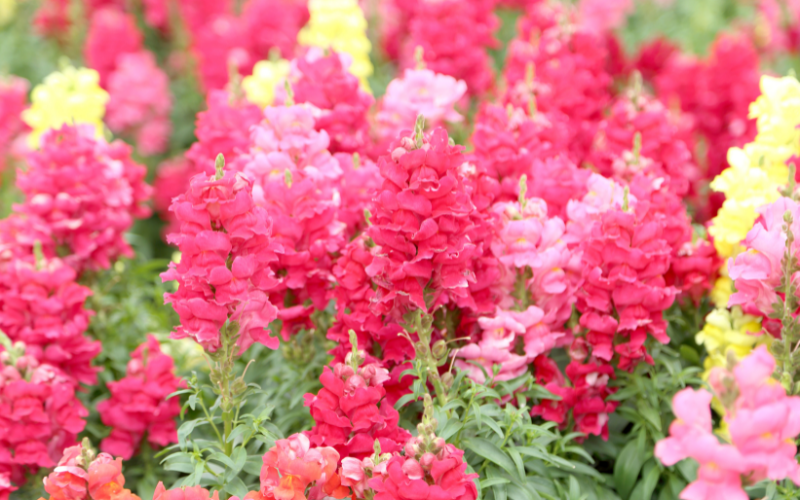
Snapdragon flower is a beautiful and unusual flower that comes in a variety of colors, including pink, yellow, orange, and purple. It is a tall plant that grows up to 3 feet in height and has a distinctive shape that looks like a dragon’s head.
The snapdragon flower is popular in gardens because of its long blooming season and its ability to attract pollinators such as hummingbirds and butterflies. In addition, the snapdragon flower has been used in traditional medicine for centuries because of its anti-inflammatory and pain-relieving properties. The snapdragon flower is also commonly used in floral arrangements because of its unique shape and vibrant colors.
| Scientific Name | Antirrhinum |
| Native Range | Western North America and the Western Mediterranean region |
| Flowering Season | Spring |
Snow-in-Summer
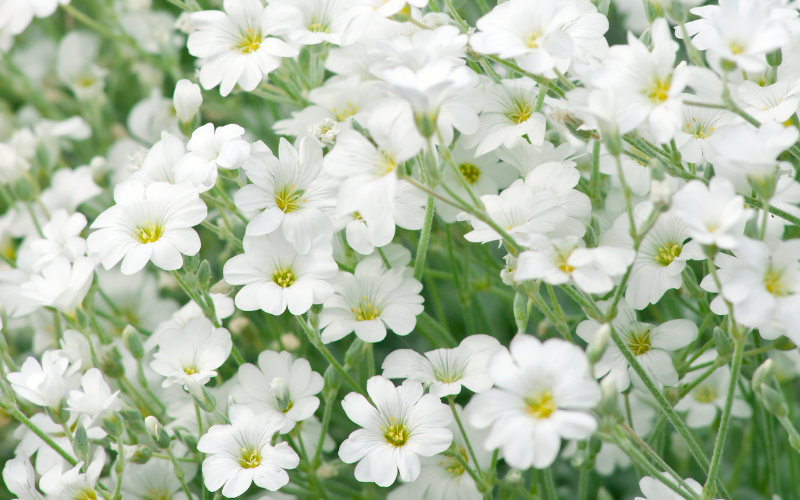
The Snow-in-Summer flower, known scientifically as Cerastium tomentosum, is a stunning plant that truly lives up to its name. This beautiful plant is characterized by its silvery-white leaves and its delicate, snow-white blossoms, which bloom during the summer months.
The Snow-in-Summer flower is native to parts of Europe and Asia and is most commonly grown as a ground cover in rock gardens or as a border plant in flower beds. This plant is very hardy and can thrive in a variety of soil types, including sandy, clay, or loamy soil, as long as it is well-draining. It is also incredibly low maintenance, requiring minimal watering and fertilization.
| Scientific Name | Cerastium tomentosum |
| Native Range | Europe |
| Flowering Season | Late spring to early summer |
Salvia Splendens
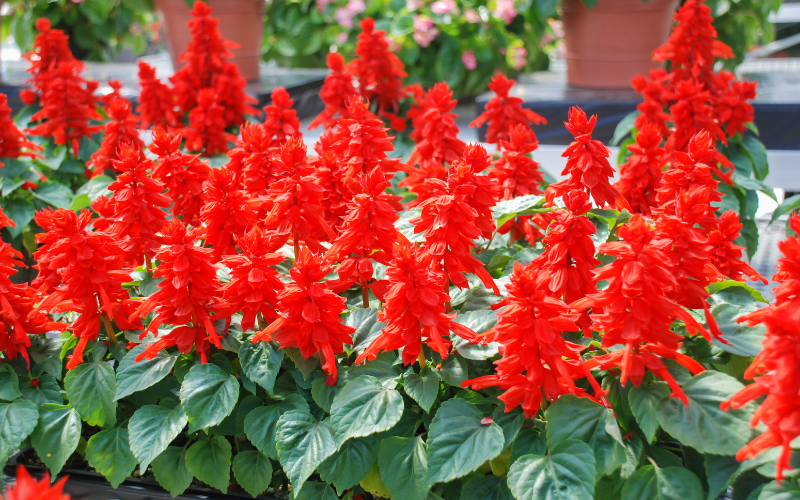
Salvia Splendens is a beautiful flower. It is native to Brazil. Flowers are typically bright red in color but they are also cultivars available with flowers in various shades of pink, purple, white, and bicolor combinations.
It has an upright, bushy growth habit and can reach heights of 1 to 2 feet (30 to 60 centimeters). Salvia splendens bloom prolifically throughout the warm months, from late spring until the first frost in autumn.
| Scientific Name | Salvia splendens |
| Native Range | Brazil |
| Flowering Season | Late spring to fall |
Sand Dollar Cactus
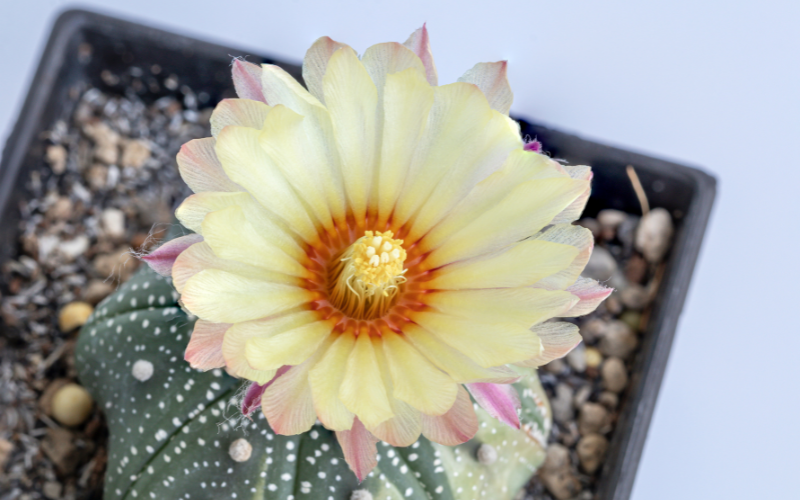
The Sand Dollar Cactus is a fascinating and visually striking plant. It is also known as the Astrophytum asterias. It is Native to the Sonoran Desert in Mexico and the southwestern United States.
The Sand Dollar Cactus Flower blooms in shades of vivid pink and magenta. Each flower is typically around 2-3 inches in diameter.
| Scientific Name | Astrophytum asterias |
| Native Range | United States and Mexico |
| Flowering Season | Winter |
Sand Phlox
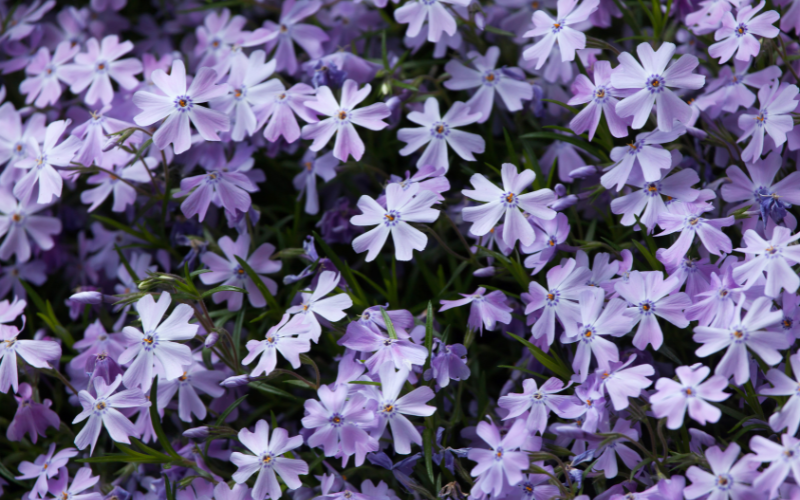
The Sand Phlox flower is a stunning and unique wildflower. It is also known as Phlox bifida. It is native to regions of North America. Sand Phlox produces small, star-shaped flowers with five petals.
The flowers can be pink, lavender, or white, and they often have a darker-colored center, creating a beautiful contrast. Sand Phlox typically blooms in the spring, producing a delightful carpet of colorful flowers.
| Scientific Name | Phlox bifida |
| Native Range | Central United States |
| Flowering Season | Mid-Spring to Early Summer |
Scarlet Strawberry
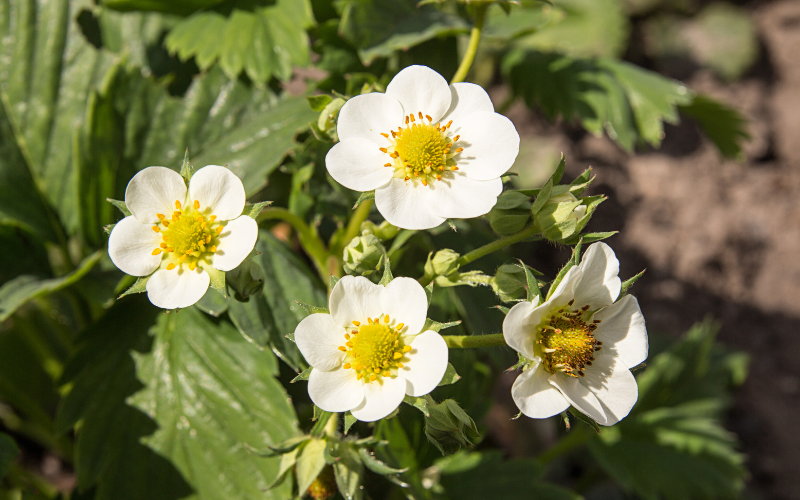
Scarlet Strawberry is a beautiful flower. This flower is scientifically known as Fragaria ananassa. The flowers of Scarlet Strawberry are small, white, and five-petaled, with a yellow center.
The flowers are typically small, measuring about 1 to 2 centimeters in diameter. In temperate regions, strawberries typically flower in late spring to early summer. They prefer well-draining, fertile soil and full sun to produce the best fruit.
| Scientific Name | Fragaria virginiana |
| Native Range | Eastern N. America – Newfoundland to South Dakota, south to Florida and Oklahoma |
| Flowering Season | Late spring to early summer |
Saponaria
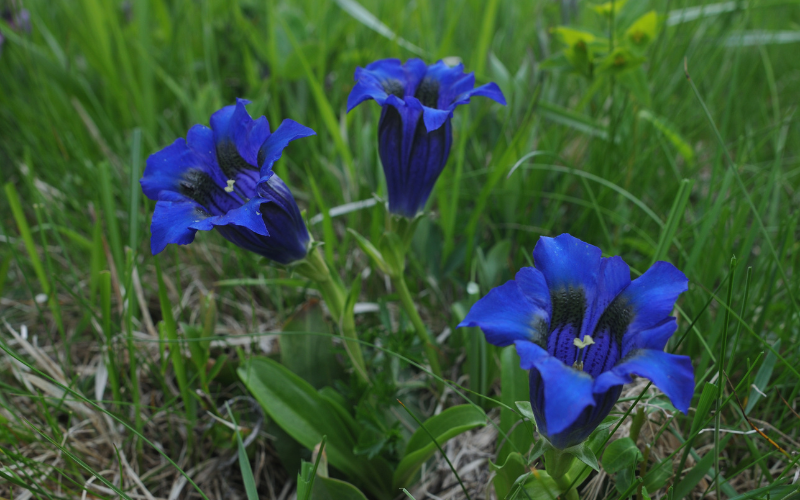
The Saponaria flower is a stunning and versatile plant. It is native to Europe, Asia, and North America.
The flowers of Saponaria plants can come in various colors, including white, pink, magenta, and sometimes red. The blooming period for Saponaria flowers typically occurs during the late spring and summer months.
| Scientific Name | Saponaria |
| Native Range | Europe, and in Asia to western Siberia |
| Flowering Season | Spring |
Scabiosa
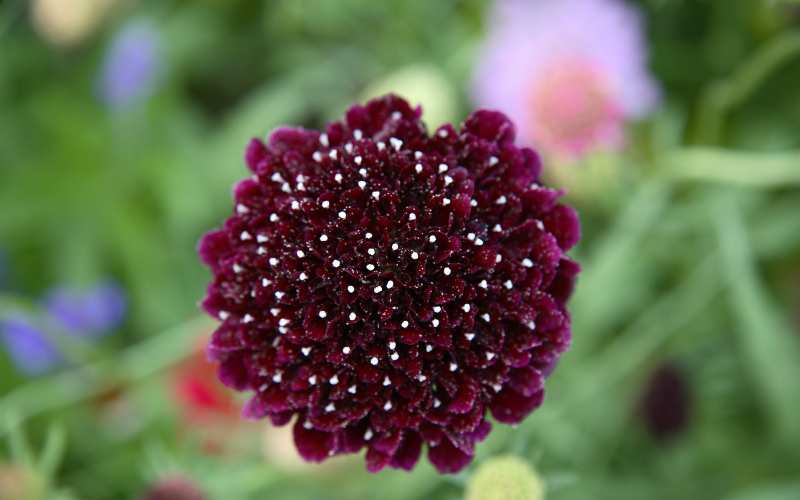
The Scabiosa is a beautiful flower. Scabiosa plants are native to Europe and parts of Asia. They come in various colors, including shades of blue, lavender, pink, white, and even deep burgundy.
They usually bloom during the summer, from late spring to early fall . Scabiosa prefers well-draining soil and thrives in full sun to partial shade. They can tolerate a wide range of soil conditions, making them relatively easy to grow.
| Scientific Name | Scabiosa columbaria |
| Native Range | Europe, Africa, and western Asia, from Sweden to Angola |
| Flowering Season | Spring until frost |
Scaevola
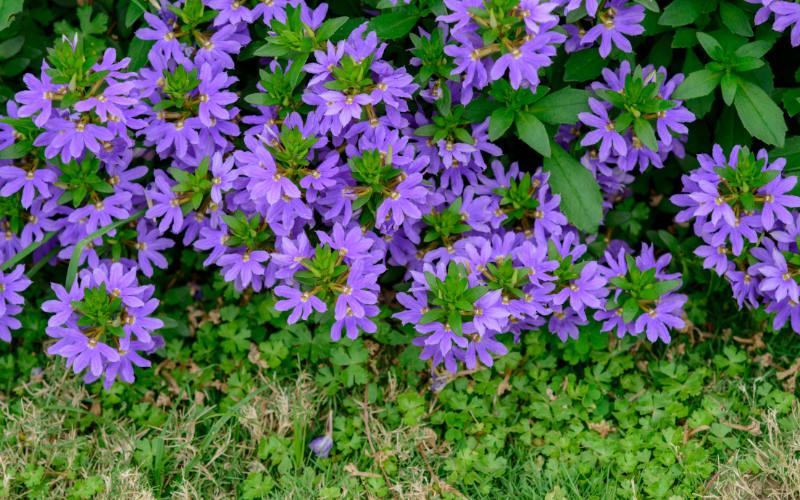
The Scaevola is a mesmerizing and unique flower. It is native to Australia and some Pacific Islands. Scaevola flowers come in various colors, including shades of blue, lavender, pink, white, and sometimes even yellow.
Scaevola flowers bloom profusely throughout the warm months, from late spring to fall . Scaevola thrives in full sun to partial shade and prefers well-draining soil. They are well-suited to warm and sunny climates.
| Scientific Name | Scaevola |
| Native Range | Australia and Polynesia |
| Flowering Season | Early summer right up to frost |
Scarlet Buckeye
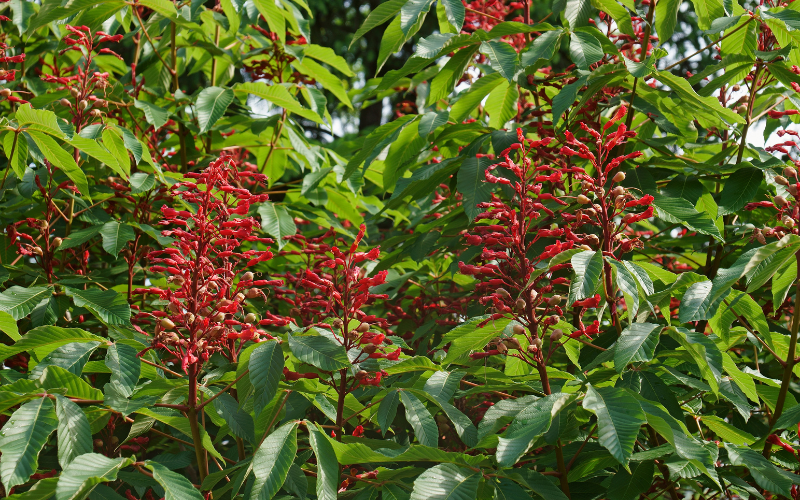
The Scarlet Buckeye is scientifically known as Aesculus pavia. It is native to the southeastern United States. The flowers are bright red in color and have five fused petals that form a tubular shape with a flared lip.
It blooms in late spring or early summer. The Scarlet Buckeye Flower is a deciduous plant that typically grows up to 10 to 20 feet tall, making it a wonderful addition to larger gardens.
| Scientific Name | Aesculus pavia |
| Native Range | North America |
| Flowering Season | Spring |
Scented Geranium
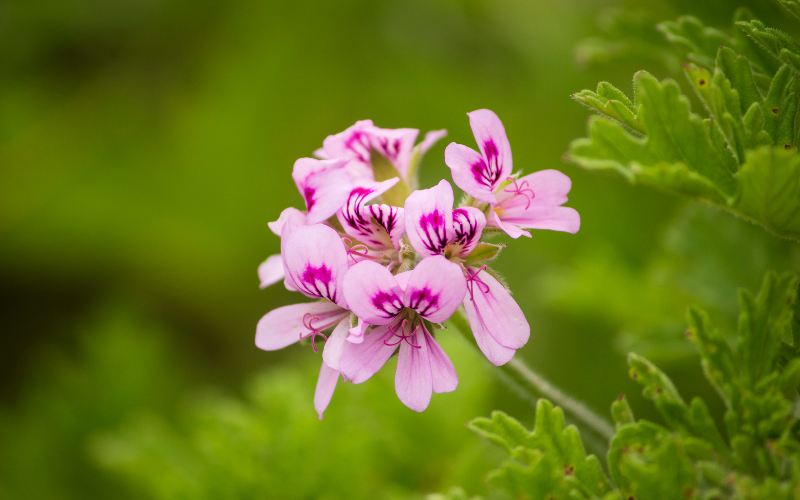
The scented geranium flower with its delicate and vibrant plant. It is scientifically known as Pelargonium. It comes in various colors, including white, pink, lavender, and mauve.
They are typically bushy, compact plants that can range in size from a few inches to a couple of feet in height. Scented Geraniums can bloom throughout the growing season, typically from late spring to fall.
| Scientific Name | Pelargonium graveolens |
| Native Range | South Africa |
| Flowering Season | Spring-fall |
Scilla
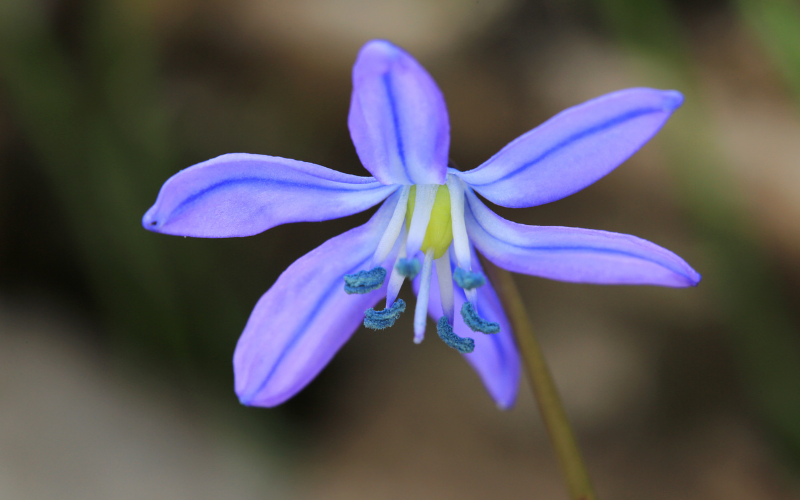
Scilla is a beautiful flower. Scilla species are native to Europe, North Africa, and parts of Asia. The flower comes in various colors, including shades of blue, purple, pink, and white.
Most Scilla species bloom in the spring. They prefer well-draining soil and typically thrive in sunny to partially shaded locations. Its star-shaped petals and slender, graceful stems sway gently in the breeze, creating a mesmerizing display.
| Scientific Name | Scilla siberica |
| Native Range | Southwestern Russia, the Caucasus, and Turkey |
| Flowering Season | Spring-Summer |
Solomon’s seal
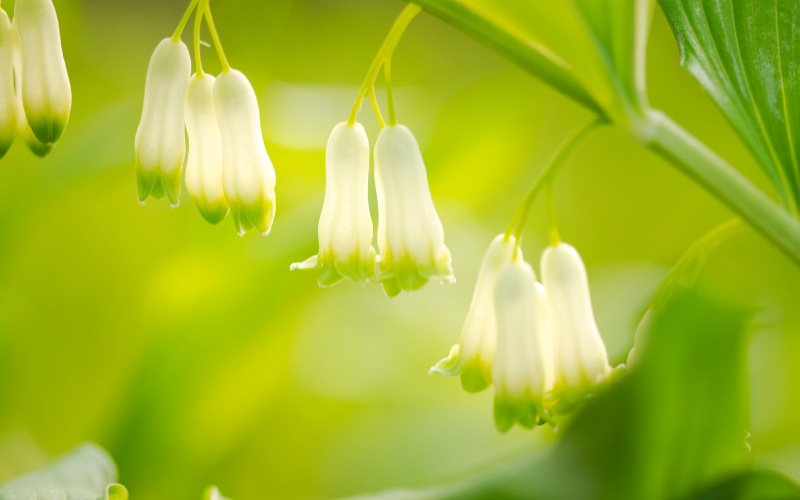
Solomon’s seal, or Polygonatum, is a beautiful plant that belongs to the Asparagaceae family. It is native to Asia, Europe, and North America, these come in white, cream, or green hues. Blooms from late spring to early summer prefer wet, well-drained soil, and can reach a height of 3 feet.
Solomon’s seal has smooth, gently arching stems with leaves spread evenly along the stem. The leaves are oval in shape and show a unique parallel line pattern. The beautifully curving stems form a lovely arch, providing a touch of elegance to any garden.
| Scientific Name | Polygonatum |
| Native Range | Eastern North America, from New England to Florida and west to Nebraska and Texas |
| Flowering Season | Late spring to early summer |
Shining Bluestar
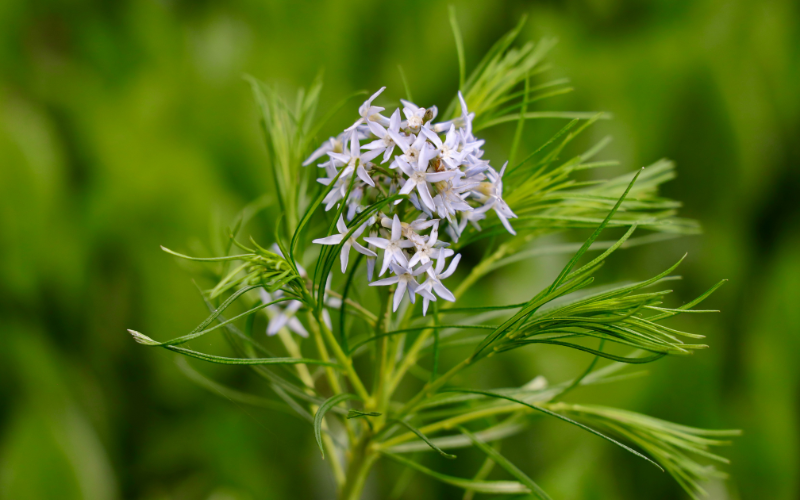
Shining Bluestar is an amazing Apocynaceae family plant. It is scientifically known as Amsonia illustris. The plant derives its name from the brilliant blue color of its star-shaped flowers, which are native to the southeastern United States.
Blooms in late spring to early summer prefer well-drained soil and can reach a height of 3 feet. When crushed, its leaves release a pleasant scent. Shining Bluestar has thin green leaves that turn a gorgeous golden-yellow in the autumn, creating a stunning autumn show.
| Scientific Name | Amsonia illustris. Apocynaceae |
| Native Range | Kansas, Missouri, Oklahoma, Arkansas and Texas |
| Flowering Season | Late spring to early summer |
St. John’s Wort
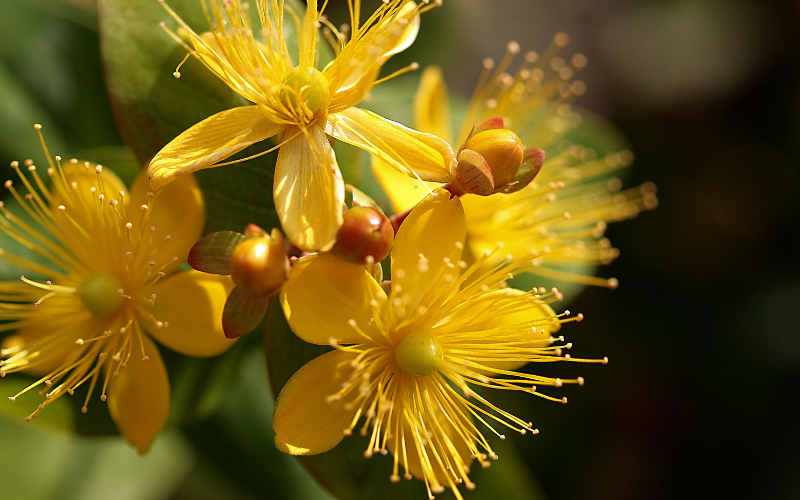
St. John’s Wort, or Hypericum perforatum, is a versatile plant in the Hypericaceae family. This European native sticks out with its bright yellow blossoms.
Blooms during the summer months, thrive in well-drained soil, and can reach a height of 3 feet. St. John’s Wort has a striking appearance due to its bright green leaves with tiny transparent oil glands that give them a ripped look when held up to the light. St. John’s Wort is an excellent addition to flower beds, borders, and rock gardens.
| Scientific Name | Hypericum perforatum |
| Native Range | Europe, western Asia, and North Africa, St. Johnswort (Hypericum perforatum) |
| Flowering Season | Summer |
Smoke Tree
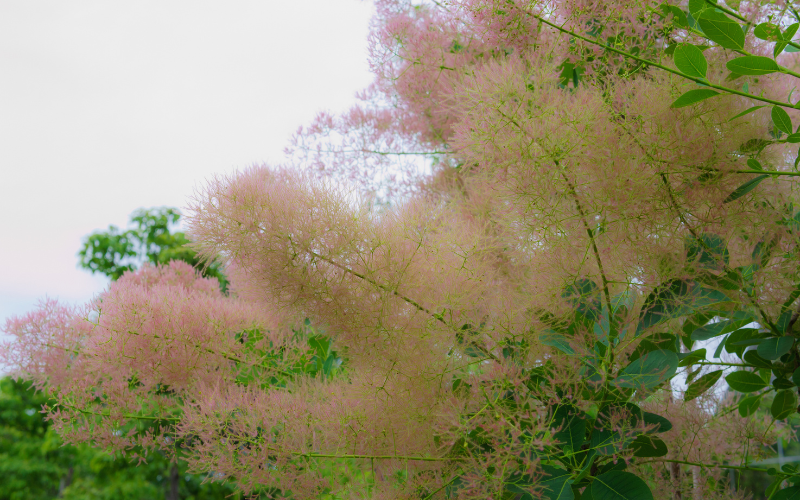
The smoke tree, or Cotinus coggygria, is an exotic plant in the Anacardiaceae family. Its colors range from delicate pinks and purples to rich magentas and burgundies and is native to Southern Europe and Asia. Blooms during the summer months, grows up to 20 ft. tall, and thrives in well-drained clay, loam, or sandy soil.
The tree’s name comes from the clusters of tiny, fragile blossoms that resemble puffs of smoke. The leaves are oval in shape and bright green in color, giving a great backdrop for the eye-catching blossoms.
| Scientific Name | Cotinus coggygria |
| Native Range | Southeastern United States, from Tennessee south to Alabama and west to Oklahoma and eastern Texas |
| Flowering Season | Summer |
Scarlet Rose Mallow
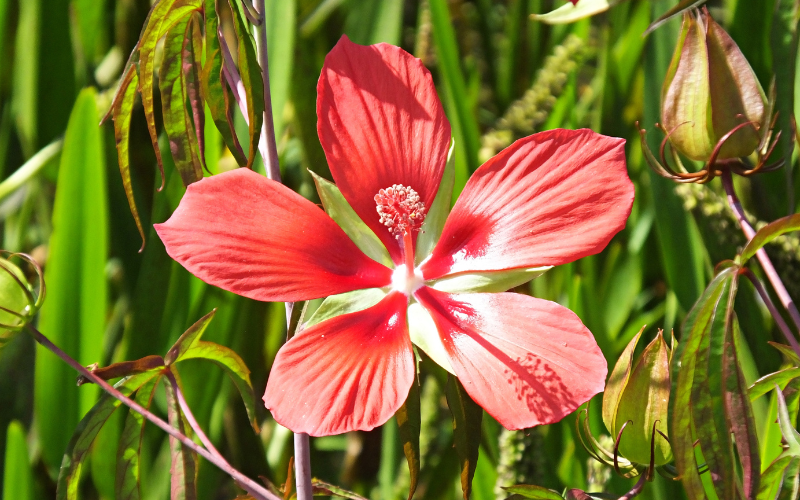
Scarlet Rose Mallow, or Hibiscus coccineus, is a member of the Malvaceae family. These are native to the southeastern United States and appear in a variety of beautiful colors, including brilliant reds, pinks, and whites.
Blooms from late spring to early fall prefer moist, well-drained soil, and can reach a height of 8 feet. With its tall stalks and huge, amazing red blossoms, the Scarlet Rose Mallow stands out as a standout choice for any garden lover looking for beauty in their outdoor space.
| Scientific Name | Hibiscus coccineus |
| Native Range | Southeastern United States |
| Flowering Season | Mid-Summer to Early fall |
Sunflower
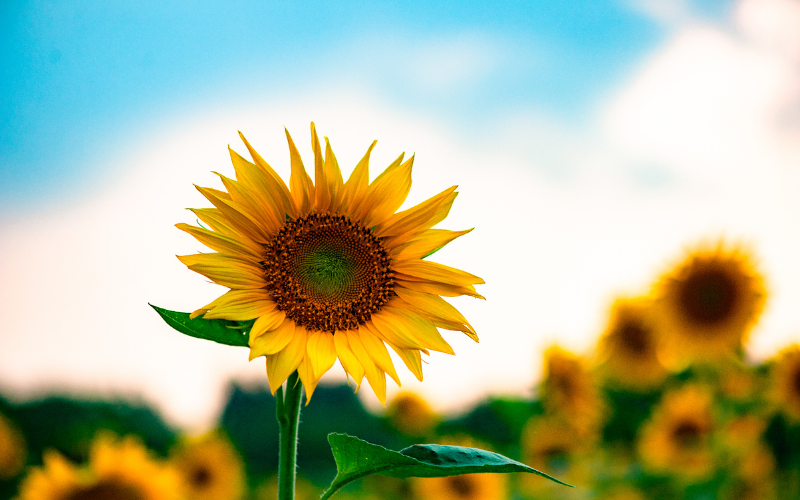
Sunflower, or Helianthus, is an attractive plant in the Asteraceae family. Native to North and Central America these range from bright yellow to rich oranges, reds, and even bi-color mixes. Blooms in the summer and early fall prefer well-drained soil and can reach a height of 12 feet.
Their seeds are rich in healthy fats, protein, and other nutrients and due to their moisturizing and nourishing traits, sunflower oil is widely used in food and beauty items. They have huge, oval flower heads with a unique brown circle in the center around colorful petals. The petals are placed in several layers to create a striking design.
| Scientific Name | Helianthus annuus |
| Native Range | North America and Mexico |
| Flowering Season | Summer |
Stonecrop
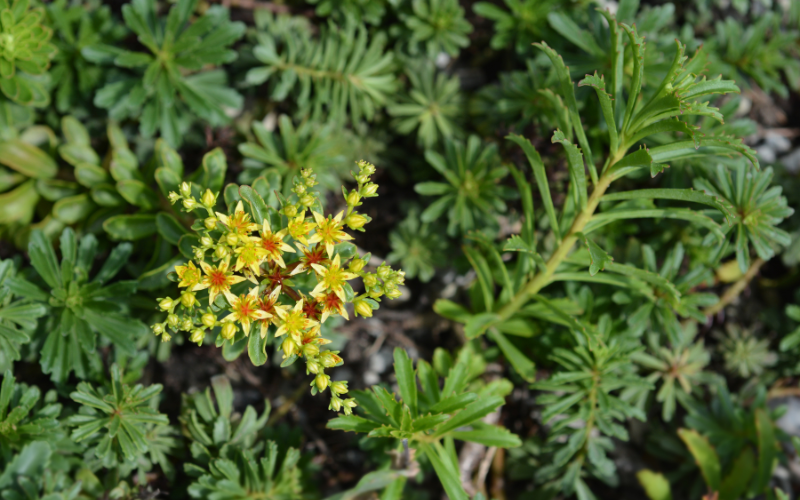
Stonecrop, or Sedum, is an attractive plant in the Crassulaceae family. It is native to North America these come in a range of colors, including vivid greens, deep reds, and even purples. Blooms in late summer or early fall prefer well-drained soil and can reach a height of 2 feet.
Stonecrop blooms in clusters of little star-shaped flowers, luring pollinators such as bees and butterflies. Stonecrop can range in size from low-growing groundcovers to taller, erect plants making it a beautiful addition to any garden.
| Scientific Name | Sedum |
| Native Range | North America, Europe, Asia |
| Flowering Season | Summer, Fall |
Sweet alyssum
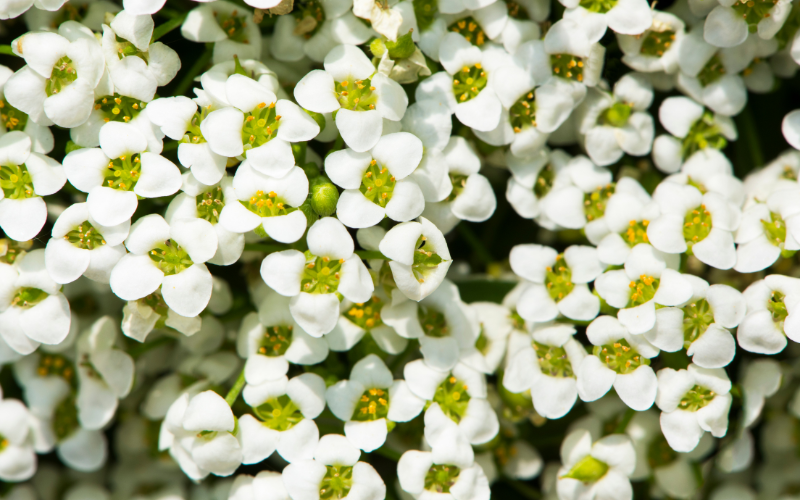
Sweet alyssum, or Lobularia maritima, is a fragrant Brassicaceae family flower. Native to the Mediterranean region these occur in a variety of colors, including white, lavender, pink, and purple. Blooms from spring through fall prefer well-drained soil and can reach a height of 12 inches.
Sweet alyssum has tiny, fragrant flowers clustered atop thin stems, petals are tiny and have a bent edge, giving them a unique appearance. The foliage gives a dense and rich carpet-like ground cover, attracting pollinators such as bees and butterflies, making it a great choice for pollinator beds.
| Scientific Name | Alyssum |
| Native Range | Mediterranean, Canary Islands, and Azores |
| Flowering Season | Spring |
Safflower
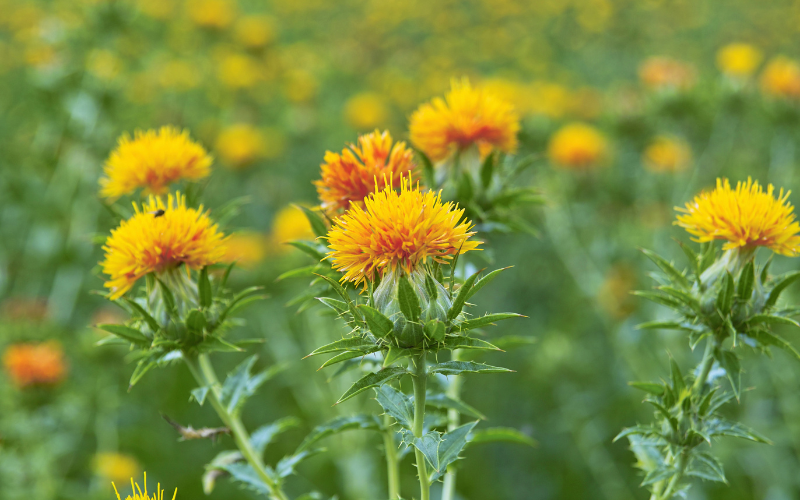
Safflower, or Carthamus tinctorius, is a unique plant of the Asteraceae family and is native to the Middle East and parts of Asia. Its colors range from yellow and orange to deep red. Blooming from late spring to early summer needs well-drained soil, and can grow up to 4 ft. tall.
Safflower has a unique appearance. Long, thin stems with green spiky leaves and blooms having a unique shape, with raised petals giving them a charming and lovely look also attracting bees and butterflies with their bright hues and tasty nectar.
| Scientific Name | Carthamus tinctorius |
| Native Range | Asia, the Middle East, and Africa |
| Flowering Season | Late spring to summer |
Sweet-scented geranium
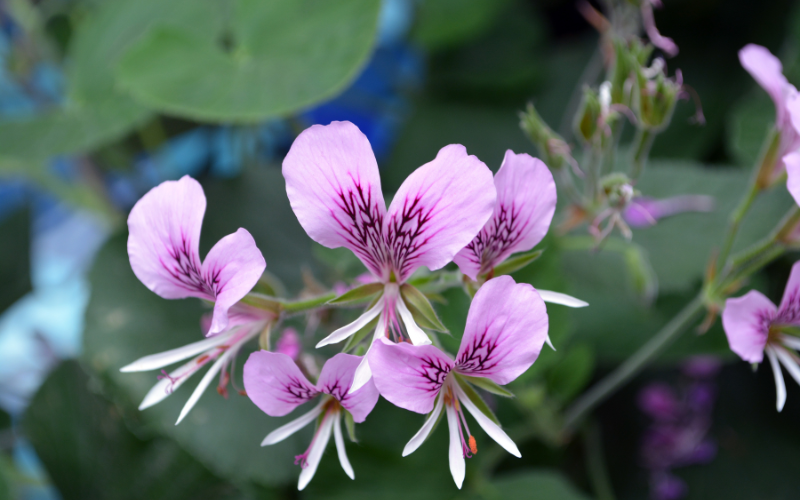
Sweet-scented geranium, or pelargonium graveolens, belongs to the Geraniaceae family. Native to South Africa these come in a variety of colors, including pink, purple, and white. Blooming from late spring to early fall these need well-drained soil and can grow up to 3 ft. tall.
They produce clusters of tiny flowers and have beautiful, angled leaves with a velvety feel. Known for their attractive and aromatic foliage, these emit a lovely fragrance when brushed or crushed, attracting butterflies and bees.
| Scientific Name | Pelargonium graveolens |
| Native Range | South and tropical Africa |
| Flowering Season | Summer |
St. John’s Wort Plant
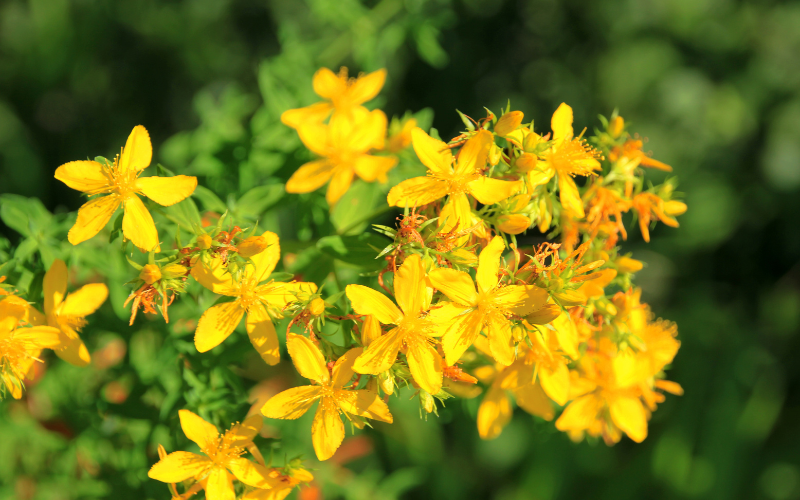
The St. John’s Wort plant is a fascinating flower. It is scientifically known as Hypericum perforatum. It is native to Europe. It is typically blooms during the summer months.
The flowers of St. John’s Wort are small, measuring around 1-2 centimeters in diameter. It prefers to grow in sunny or partially shaded areas and is often found in meadows.
| Scientific Name | Hypericum perforatum |
| Native Range | Europe, Asia, and North Africa |
| Flowering Season | Summer |
Spiny Lilac Flower Cactus
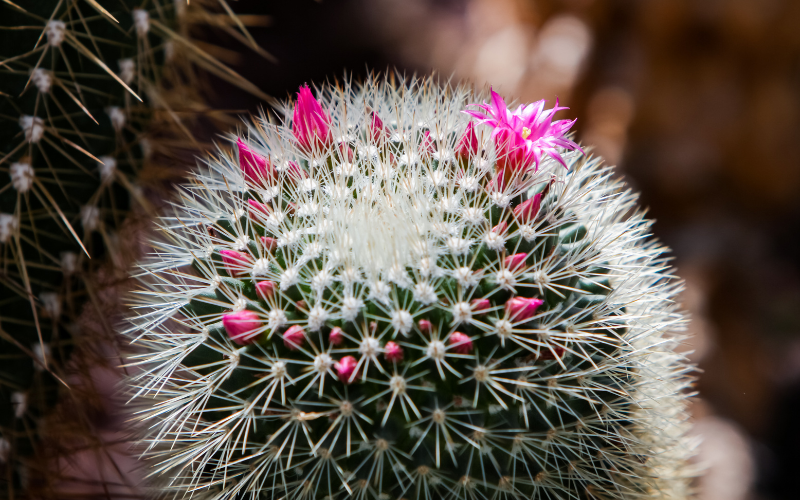
The Spiny Lilac Flower Cactus is a beautiful flower. It is scientifically known as Echinocereus reichenbachii. It is typically blooms during the spring and early summer months.
They are generally tubular in shape and can measure several inches in length. Its ability to thrive in arid conditions and its low maintenance needs make it a popular choice for both experienced gardeners and beginners.
| Scientific Name | Acanthocalycium violaceum |
| Native Range | Mexico |
| Flowering Season | Late spring-early fall |
Spiked Speedwell
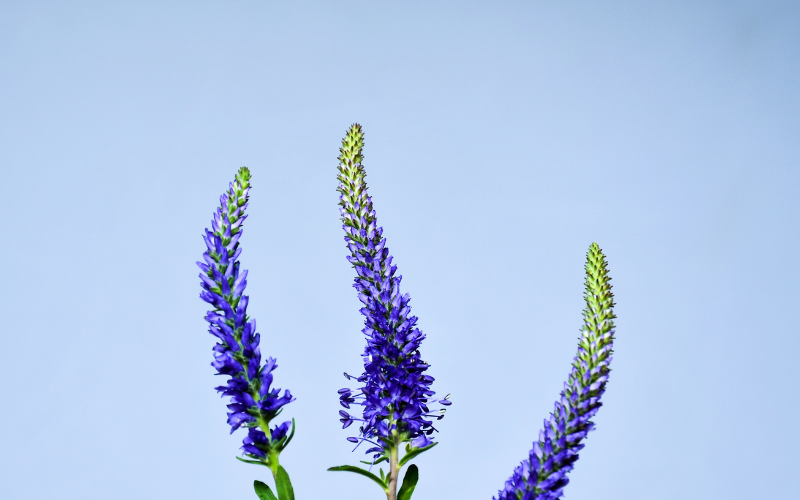
Spiked Speedwell is a charming flower. It is scientifically known as Veronica spicata. It is native to Europe and Asia. Spiked Speedwell produces tall, slender flower spikes that can reach heights of 1 to 3 feet (30 to 90 centimeters).
Flower colors can vary and include shades of blue, violet, pink, and white. Spiked Speedwell blooms during the late spring to early summer months.
| Scientific Name | Veronica spicata |
| Native Range | Europe, Asia |
| Flowering Season | Summer |
Spider Lily
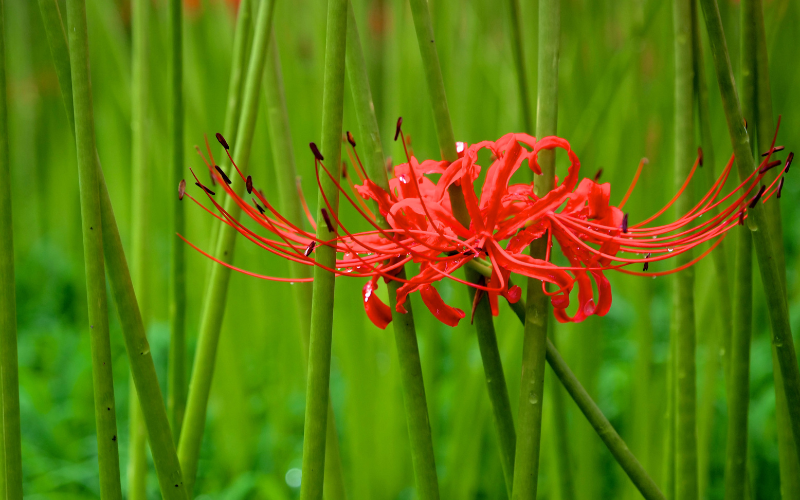
Spider Lily is a unique and striking flowering plant. It is scientifically known as Hymenocallis. It is native to warm tropical regions. Spider Lilies have large, white, or cream-colored flowers.
It typically blooms in the late spring or early summer. The exact flowering period may vary depending on the species and local climate. They thrive in well-draining soil and prefer full to partial sunlight.
| Scientific Name | Hymenocallis littoralis |
| Native Range | China, Japan, Korea and Nepal |
| Flowering Season | Spring and Fall |
Southern Blue Flag
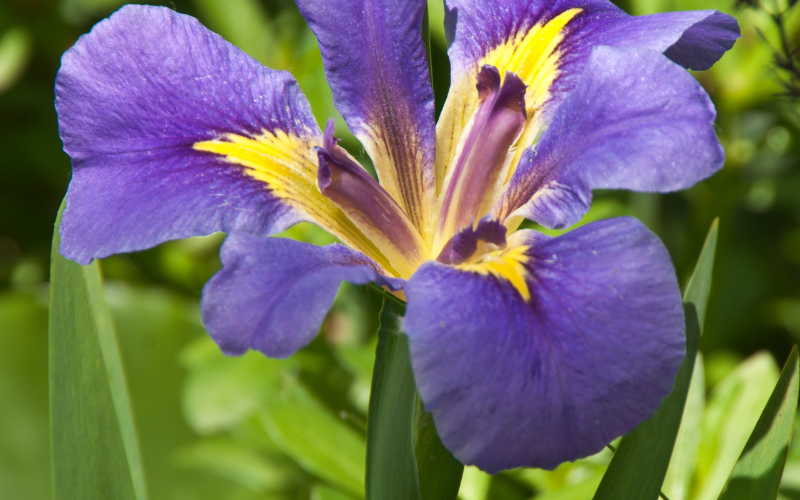
The Southern Blue Flag is a lovely flower. It is scientifically known as Iris virginica var. shrevei. It is native to the southeastern United States. The flowers come in various shades of blue to purple.
The Southern Blue Flag typically blooms in late spring to early summer. It thrives in moist to wet soil conditions, making it an excellent choice for water gardens or areas with consistently damp soil.
| Scientific Name | Iris virginica var. |
| Native Range | Virginia, south to Florida, and west to eastern Texas |
| Flowering Season | Spring |
Society Garlic
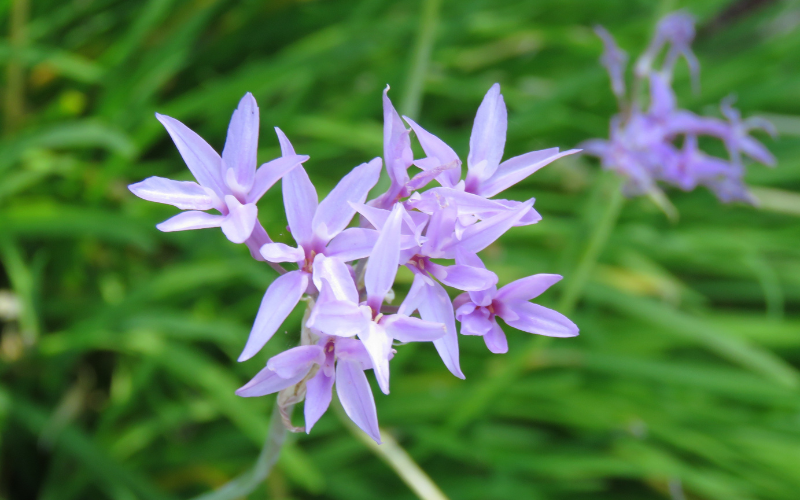
Society Garlic is a beautiful flower. It is scientifically known as Tulbaghia violacea. It is native to South Africa. The flowers are typically a pale lavender to mauve color. Society Garlic typically blooms from late spring through summer.
This plant thrives in well-draining soil and is quite resilient in hot and dry conditions. It prefers full sun but can tolerate partial shade.
| Scientific Name | Tulbaghia violacea |
| Native Range | eastern South Africa |
| Flowering Season | Summer |
Showy Stonecrop
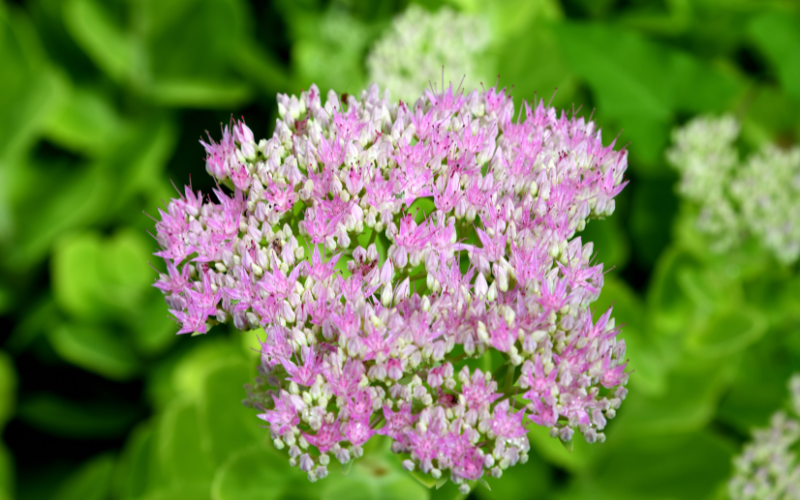
The showy stonecrop is a lovely flower. It is scientifically known as Hylotelephium spectabile (formerly known as Sedum spectabile). It is native to Asia and Europe. The flowers come in shades of pink, mauve, or purplish pink.
The plant typically grows in a clumping, upright fashion and can reach heights of 1 to 2 feet (30 to 60 centimeters). It blooms from late summer to early fall.
| Scientific Name | Hylotelephium spectabile |
| Native Range | China and Korea |
| Flowering Season | Mid to Late Summer into Fall |
Shining Blue Star

The Shining Blue Star is a stunning flower. It is scientifically known as Amsonia illustris. It is native to North America. The Shining Blue Star blooms in late spring to early summer.
It is well-suited to gardens with moist, well-draining soil. It prefers consistently moist soil but can tolerate short periods of drought once established.
| Scientific Name | Amsonia illustris |
| Native Range | Kansas, Missouri, Oklahoma, Arkansas and Texas |
| Flowering Season | Late spring to early summer |
Syringa
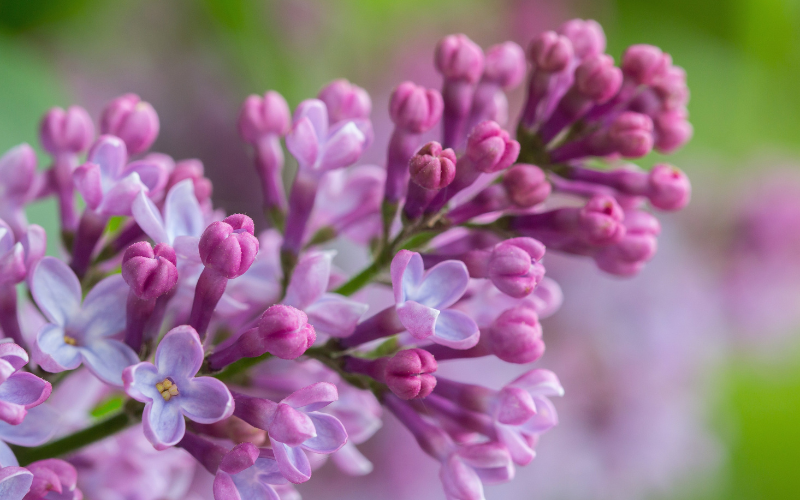
Syringa is an amazing flower. It is commonly known as lilac. It is native to various regions across Europe and Asia. The flowers come in various colors, including shades of purple, pink, white, and even yellow.
The flowers bloom in late spring to early summer. The flowers are relatively low-maintenance once established and can thrive in various climates.
| Scientific Name | Syringa vulgaris |
| Native Range | Southeastern Europe to eastern Asia |
| Flowering Season | Mid-spring to Early Summer |
Sorrel
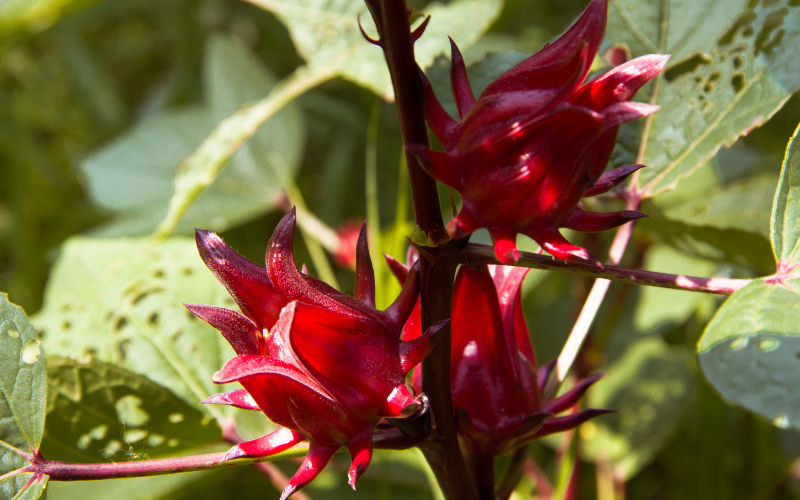
Sorrel is a beautiful flower. It is also known as Hibiscus sabdariffa. It is native to West Africa. Sorrel typically produces flowers in late spring to early summer. Sorrel plants are primarily grown for their edible leaves, which are typically arrow-shaped and have a tart, lemony flavor.
It prefers partial to full sunlight and can tolerate some shade. Sorrel is known for its low maintenance and can be grown in gardens or as part of an edible landscape.
| Scientific Name | Rumex acetosa |
| Native Range | Europe and Asia |
| Flowering Season | Summer |
Question & Answer
What is a filler flower that starts with S?
A filler flower that starts with “S” is the Statice flower (Limonium spp.)
What is Speciality cut flower?
A specialty cut flower refers to a flower that is specifically cultivated and grown for the purpose of being cut and used in floral arrangements, bouquets, or other decorative displays.
What is a modified flower?
A modified flower refers to a flower that has undergone structural changes or adaptations in its form, structure, or function compared to the typical or “normal” flower structure.
What is a complete flower?
A complete flower is a flower that possesses all four main floral organs: sepals, petals, stamens, and carpels.
What is the purpose of petals?
The petals of a flower serve several important purposes. Attraction, advertisement, protection, petaloid structures Pollinator landing platform
